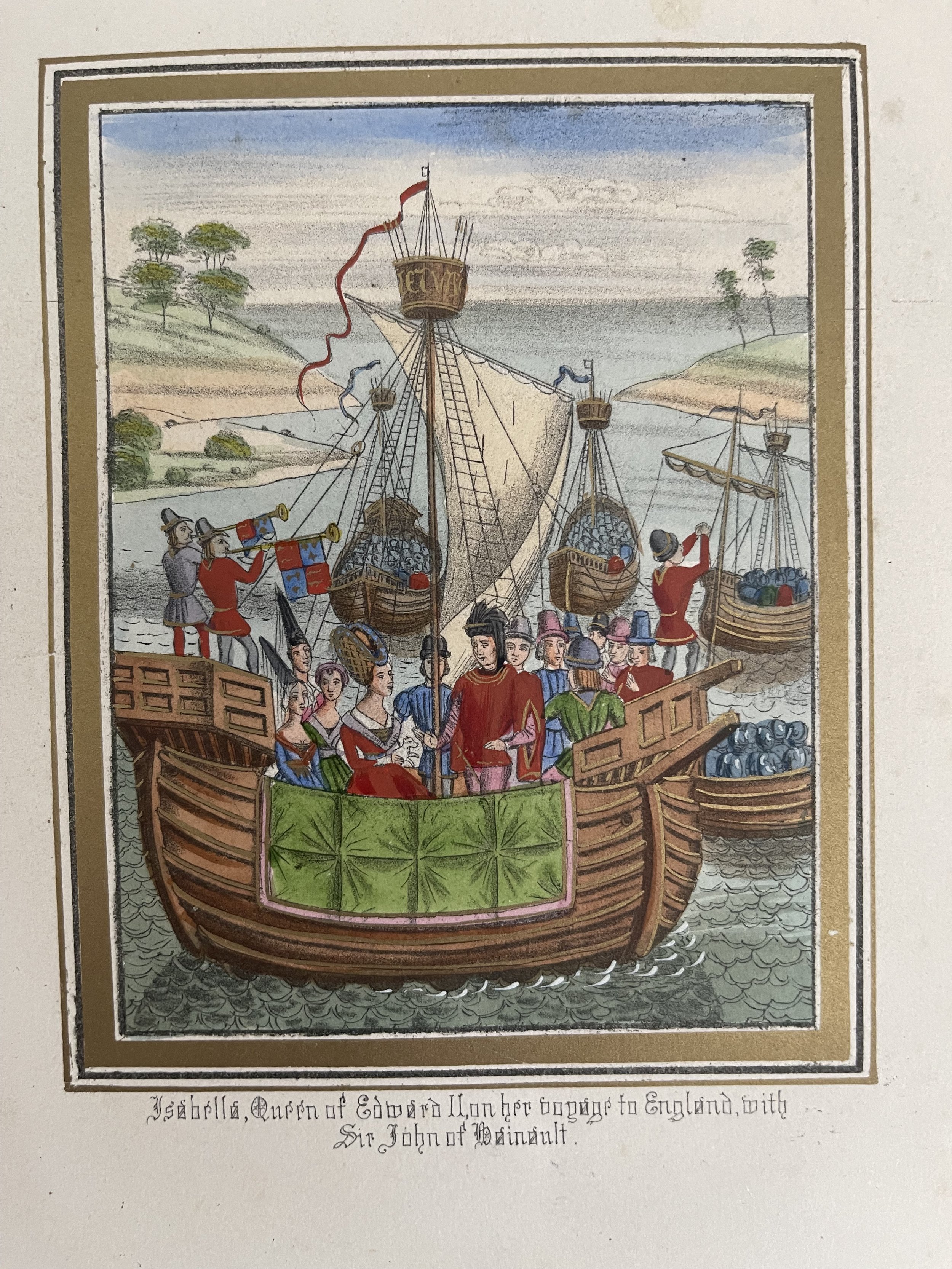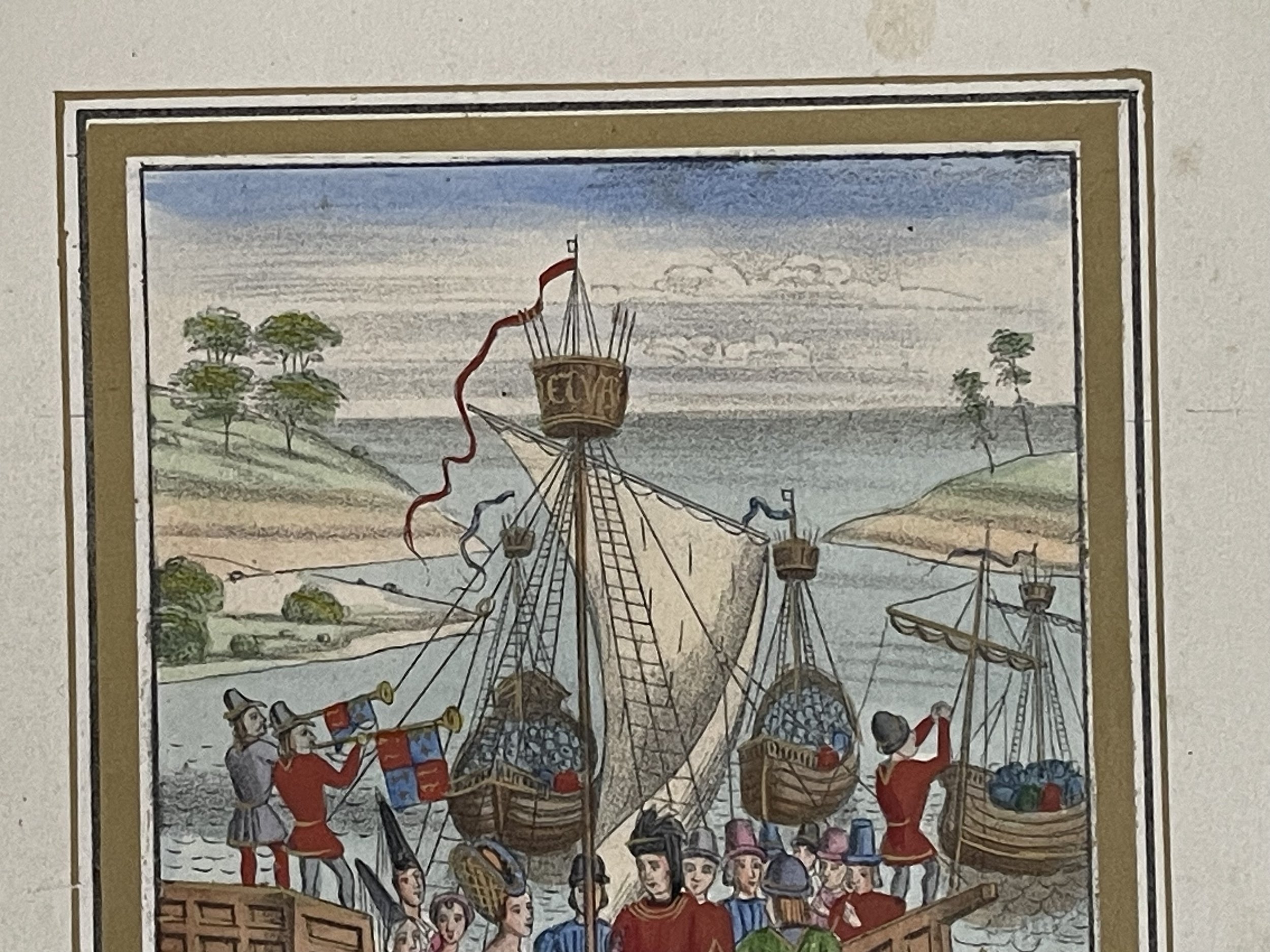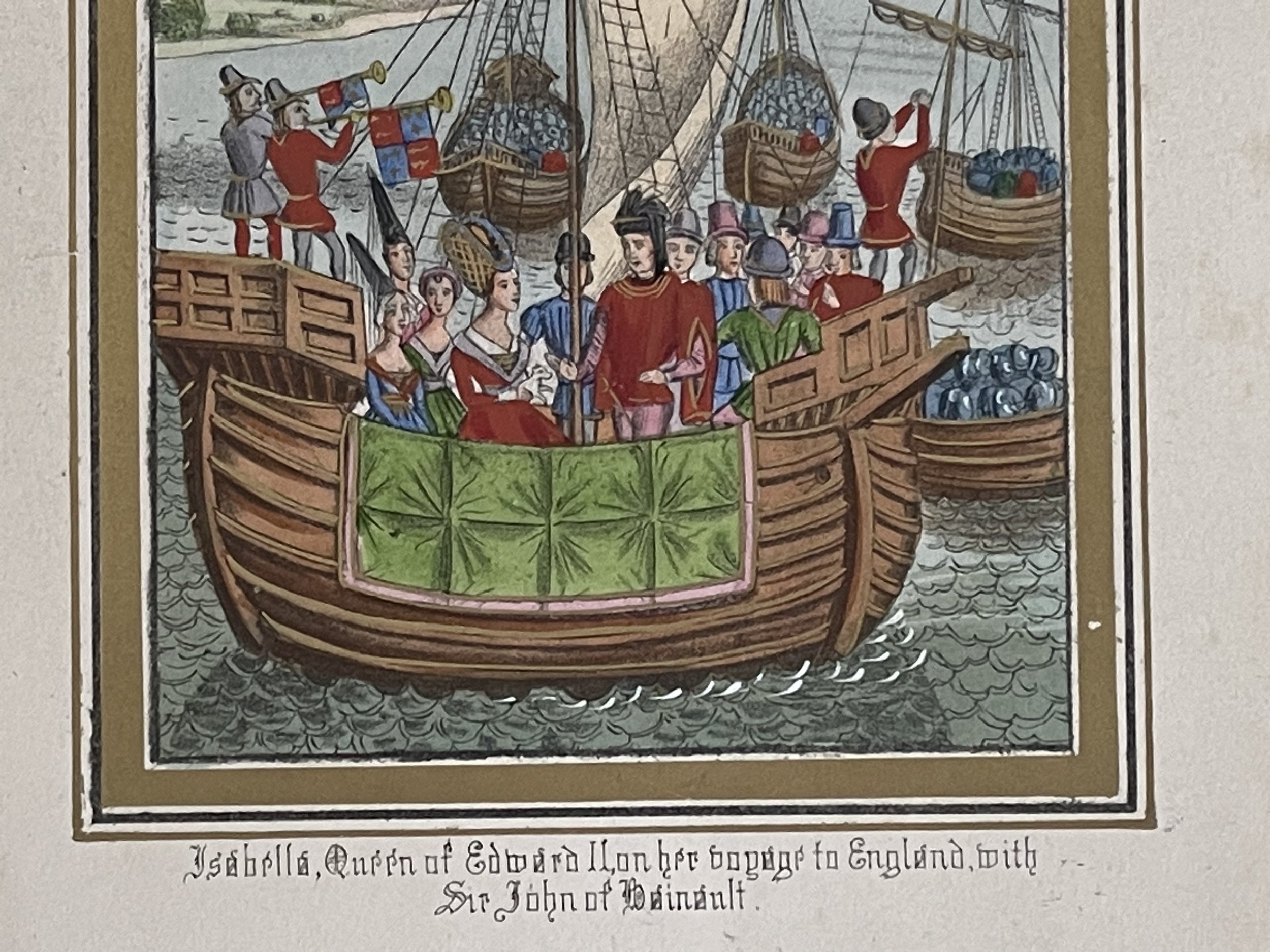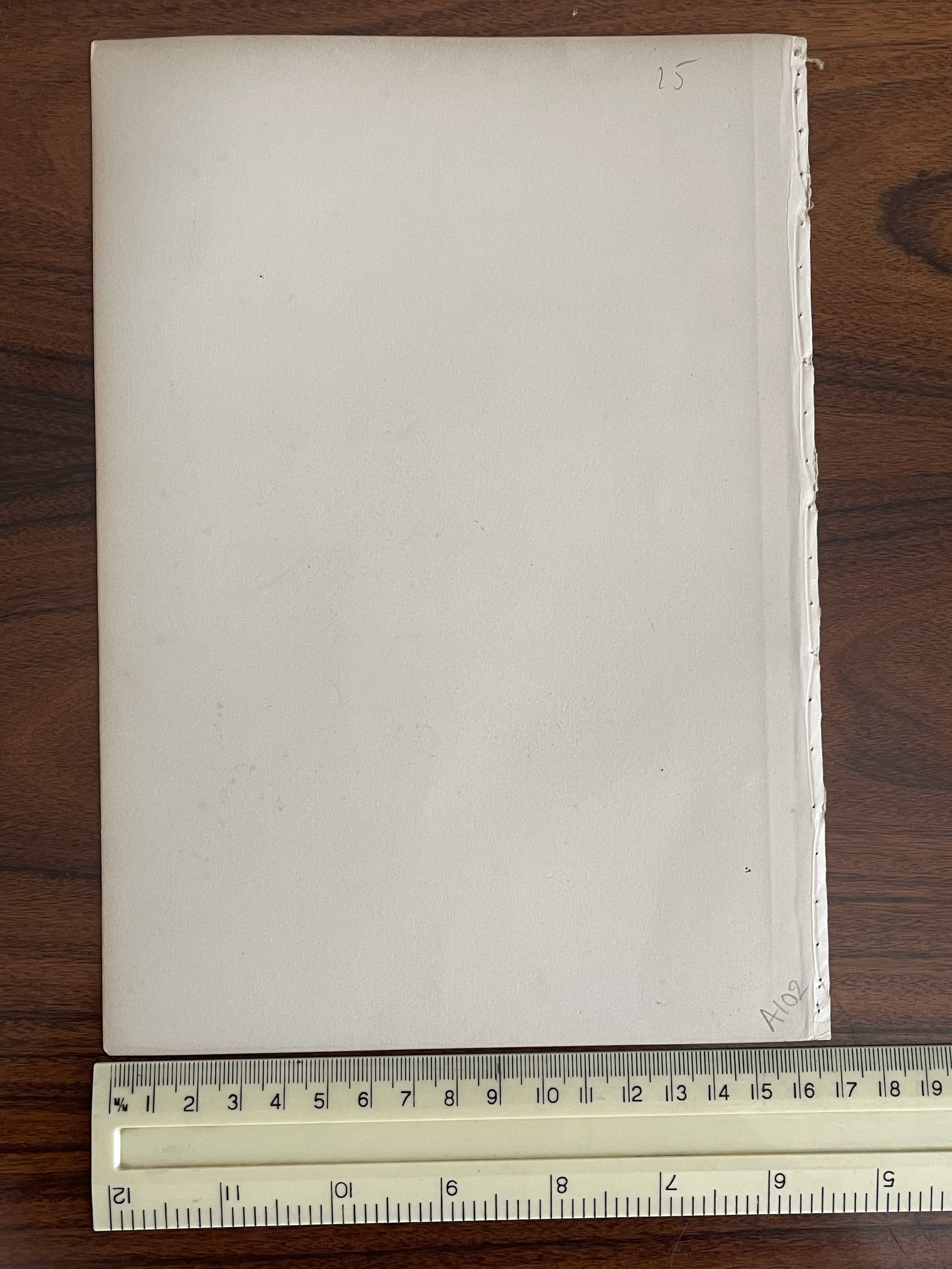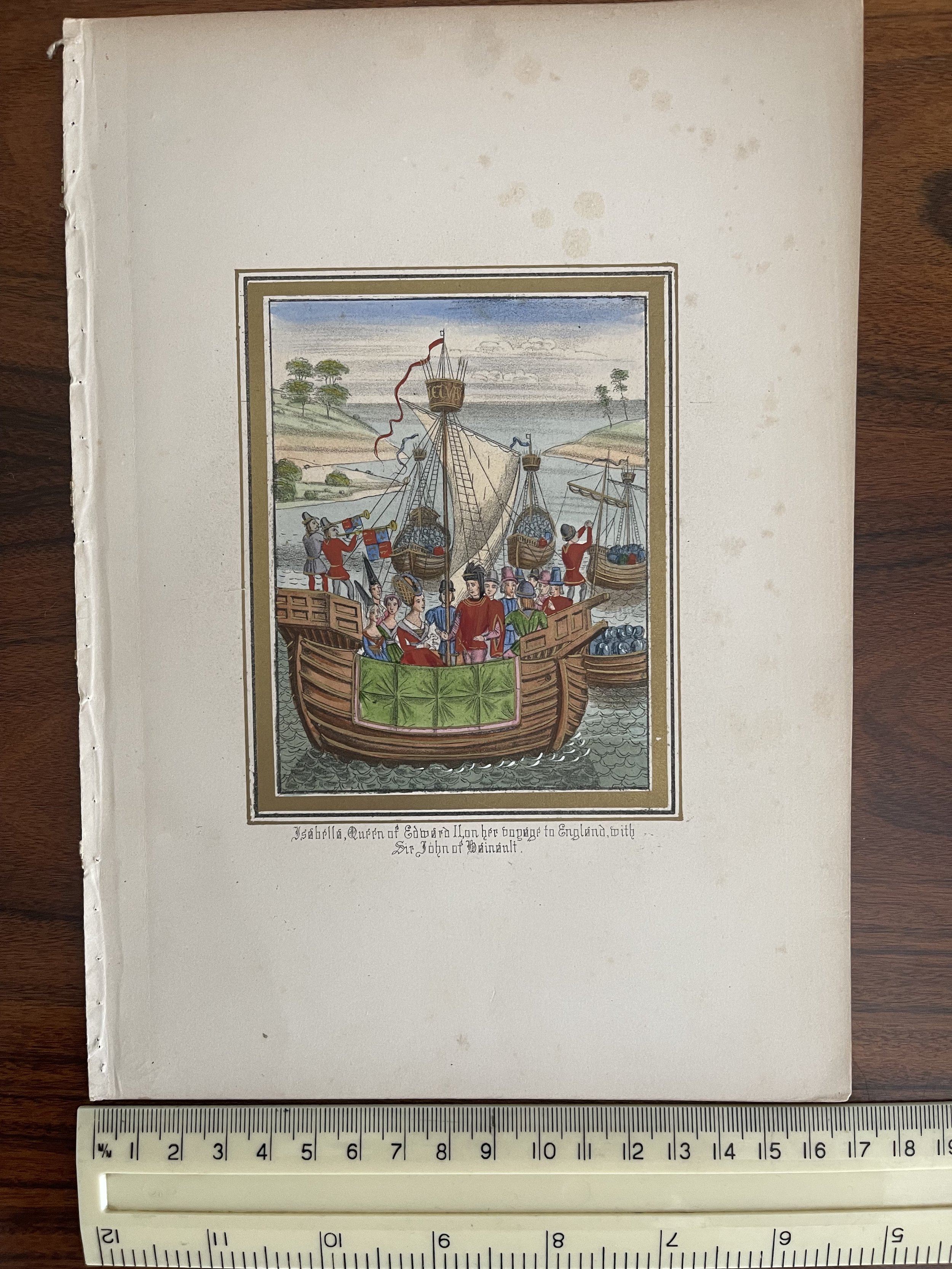Illuminated Engraving - Froissart's Chronicles - Isabella of France voyage to England - H. N. Humphreys, London (W.Smith) - 1845
Froissart's Chronicles - Isabella of France voyage to England - Isabella sails in September 1326 at the head of an invasion fleet whose ambition was the destruction of the Dispensers
Vintage colour print of showing a scene from Froissart's Chronicles. Isabella Queen of Edward II on her voyage to England, with Sir John of Hainault.
Isabella of France (c. 1295 – 22 August 1358), sometimes described as the She-Wolf of France (French: Louve de France), was Queen of England as the wife of King Edward II, and de facto regent of England from 1327 until 1330. She was the youngest surviving child and only surviving daughter of Philip IV of France and Joan I of Navarre. Isabella was notable in her lifetime for her diplomatic skills, intelligence, and beauty. She overthrew her husband, becoming a "femme fatale" figure in plays and literature over the years, usually portrayed as a beautiful but cruel and manipulative figure.
Isabella arrived in England at age 12 during a period of growing conflict between the king and the powerful baronial factions. Her new husband was notorious for the patronage he lavished on his favourite, Piers Gaveston, but the queen supported Edward during these early years, forming a working relationship with Piers and using her relationship with the French monarchy to bolster her own authority and power. After the death of Gaveston at the hands of the barons in 1312, however, Edward turned to a new favourite, Hugh Despenser the Younger, and attempted to take revenge on the barons, resulting in the Despenser War and a period of internal repression across England. Isabella could not tolerate Hugh Despenser, and by 1325, her marriage to Edward was at a breaking point.
Travelling to France on a diplomatic mission, Isabella may have begun an affair with Roger Mortimer, and the two may possibly have agreed at this point to depose Edward and oust the Despenser family. The Queen returned to England with a small mercenary army in 1326, moving rapidly across England. The King's forces deserted him. Isabella deposed Edward, becoming regent on behalf of her young son, Edward III. Some believe that Isabella then arranged the murder of Edward II. Isabella and Mortimer's regime began to crumble, partly because of her lavish spending, but also because the Queen successfully, but unpopularity, resolved long-running problems such as the war with Scotland.
In 1330, aged 18, Isabella's son, Edward III forcibly asserted his authority. Mortimer was executed, Isabella's regency was ended, and she was imprisoned, but soon released. She lived out her remaining years as a wealthy courtier and grew close again to her family especially her daughter Joan, Queen of Scots and her grandson Edward, Prince of Wales.
By 1325, Isabella was facing increasing pressure from Hugh Despenser the Younger, Edward's new royal favourite. With her lands in England seized, her children taken away from her and her household staff arrested, Isabella began to pursue other options. When her brother, King Charles IV of France, seized Edward's French possessions in 1325, she returned to France, initially as a delegate of the King charged with negotiating a peace treaty between the two nations. However, her presence in France became a focal point for the many nobles opposed to Edward's reign. Isabella gathered an army to oppose Edward, in alliance with Roger Mortimer, 1st Earl of March, whom she may have taken as a lover. Isabella and Mortimer returned to England with a mercenary army, seizing the country in a lightning campaign. The Despenser’s were executed, and Edward was forced to abdicate—his eventual fate and possible murder remains a matter of considerable historical debate. Isabella ruled as regent until 1330 when her son Edward deposed Mortimer and began to rule directly in his own right.
Froissart's Chronicles - Isabella of France voyage to England - Isabella sails in September 1326 at the head of an invasion fleet whose ambition was the destruction of the Dispensers
Vintage colour print of showing a scene from Froissart's Chronicles. Isabella Queen of Edward II on her voyage to England, with Sir John of Hainault.
Isabella of France (c. 1295 – 22 August 1358), sometimes described as the She-Wolf of France (French: Louve de France), was Queen of England as the wife of King Edward II, and de facto regent of England from 1327 until 1330. She was the youngest surviving child and only surviving daughter of Philip IV of France and Joan I of Navarre. Isabella was notable in her lifetime for her diplomatic skills, intelligence, and beauty. She overthrew her husband, becoming a "femme fatale" figure in plays and literature over the years, usually portrayed as a beautiful but cruel and manipulative figure.
Isabella arrived in England at age 12 during a period of growing conflict between the king and the powerful baronial factions. Her new husband was notorious for the patronage he lavished on his favourite, Piers Gaveston, but the queen supported Edward during these early years, forming a working relationship with Piers and using her relationship with the French monarchy to bolster her own authority and power. After the death of Gaveston at the hands of the barons in 1312, however, Edward turned to a new favourite, Hugh Despenser the Younger, and attempted to take revenge on the barons, resulting in the Despenser War and a period of internal repression across England. Isabella could not tolerate Hugh Despenser, and by 1325, her marriage to Edward was at a breaking point.
Travelling to France on a diplomatic mission, Isabella may have begun an affair with Roger Mortimer, and the two may possibly have agreed at this point to depose Edward and oust the Despenser family. The Queen returned to England with a small mercenary army in 1326, moving rapidly across England. The King's forces deserted him. Isabella deposed Edward, becoming regent on behalf of her young son, Edward III. Some believe that Isabella then arranged the murder of Edward II. Isabella and Mortimer's regime began to crumble, partly because of her lavish spending, but also because the Queen successfully, but unpopularity, resolved long-running problems such as the war with Scotland.
In 1330, aged 18, Isabella's son, Edward III forcibly asserted his authority. Mortimer was executed, Isabella's regency was ended, and she was imprisoned, but soon released. She lived out her remaining years as a wealthy courtier and grew close again to her family especially her daughter Joan, Queen of Scots and her grandson Edward, Prince of Wales.
By 1325, Isabella was facing increasing pressure from Hugh Despenser the Younger, Edward's new royal favourite. With her lands in England seized, her children taken away from her and her household staff arrested, Isabella began to pursue other options. When her brother, King Charles IV of France, seized Edward's French possessions in 1325, she returned to France, initially as a delegate of the King charged with negotiating a peace treaty between the two nations. However, her presence in France became a focal point for the many nobles opposed to Edward's reign. Isabella gathered an army to oppose Edward, in alliance with Roger Mortimer, 1st Earl of March, whom she may have taken as a lover. Isabella and Mortimer returned to England with a mercenary army, seizing the country in a lightning campaign. The Despenser’s were executed, and Edward was forced to abdicate—his eventual fate and possible murder remains a matter of considerable historical debate. Isabella ruled as regent until 1330 when her son Edward deposed Mortimer and began to rule directly in his own right.
Froissart's Chronicles - Isabella of France voyage to England - Isabella sails in September 1326 at the head of an invasion fleet whose ambition was the destruction of the Dispensers
Vintage colour print of showing a scene from Froissart's Chronicles. Isabella Queen of Edward II on her voyage to England, with Sir John of Hainault.
Isabella of France (c. 1295 – 22 August 1358), sometimes described as the She-Wolf of France (French: Louve de France), was Queen of England as the wife of King Edward II, and de facto regent of England from 1327 until 1330. She was the youngest surviving child and only surviving daughter of Philip IV of France and Joan I of Navarre. Isabella was notable in her lifetime for her diplomatic skills, intelligence, and beauty. She overthrew her husband, becoming a "femme fatale" figure in plays and literature over the years, usually portrayed as a beautiful but cruel and manipulative figure.
Isabella arrived in England at age 12 during a period of growing conflict between the king and the powerful baronial factions. Her new husband was notorious for the patronage he lavished on his favourite, Piers Gaveston, but the queen supported Edward during these early years, forming a working relationship with Piers and using her relationship with the French monarchy to bolster her own authority and power. After the death of Gaveston at the hands of the barons in 1312, however, Edward turned to a new favourite, Hugh Despenser the Younger, and attempted to take revenge on the barons, resulting in the Despenser War and a period of internal repression across England. Isabella could not tolerate Hugh Despenser, and by 1325, her marriage to Edward was at a breaking point.
Travelling to France on a diplomatic mission, Isabella may have begun an affair with Roger Mortimer, and the two may possibly have agreed at this point to depose Edward and oust the Despenser family. The Queen returned to England with a small mercenary army in 1326, moving rapidly across England. The King's forces deserted him. Isabella deposed Edward, becoming regent on behalf of her young son, Edward III. Some believe that Isabella then arranged the murder of Edward II. Isabella and Mortimer's regime began to crumble, partly because of her lavish spending, but also because the Queen successfully, but unpopularity, resolved long-running problems such as the war with Scotland.
In 1330, aged 18, Isabella's son, Edward III forcibly asserted his authority. Mortimer was executed, Isabella's regency was ended, and she was imprisoned, but soon released. She lived out her remaining years as a wealthy courtier and grew close again to her family especially her daughter Joan, Queen of Scots and her grandson Edward, Prince of Wales.
By 1325, Isabella was facing increasing pressure from Hugh Despenser the Younger, Edward's new royal favourite. With her lands in England seized, her children taken away from her and her household staff arrested, Isabella began to pursue other options. When her brother, King Charles IV of France, seized Edward's French possessions in 1325, she returned to France, initially as a delegate of the King charged with negotiating a peace treaty between the two nations. However, her presence in France became a focal point for the many nobles opposed to Edward's reign. Isabella gathered an army to oppose Edward, in alliance with Roger Mortimer, 1st Earl of March, whom she may have taken as a lover. Isabella and Mortimer returned to England with a mercenary army, seizing the country in a lightning campaign. The Despenser’s were executed, and Edward was forced to abdicate—his eventual fate and possible murder remains a matter of considerable historical debate. Isabella ruled as regent until 1330 when her son Edward deposed Mortimer and began to rule directly in his own right.
Code : A102
Cartographer : Cartographer / Engraver / Publisher: H N Humphries
Date : Publication Place / Date - 1845
Size : Sheet size: Image Size: 24 x 17
Availability : Available
Type - Genuine - Antique
Grading A
Where Applicable - Folds as issued. Light box photo shows the folio leaf centre margin hinge ‘glue’, this is not visible otherwise.
Tracked postage, in casement. Please contact me for postal quotation outside of the UK.
